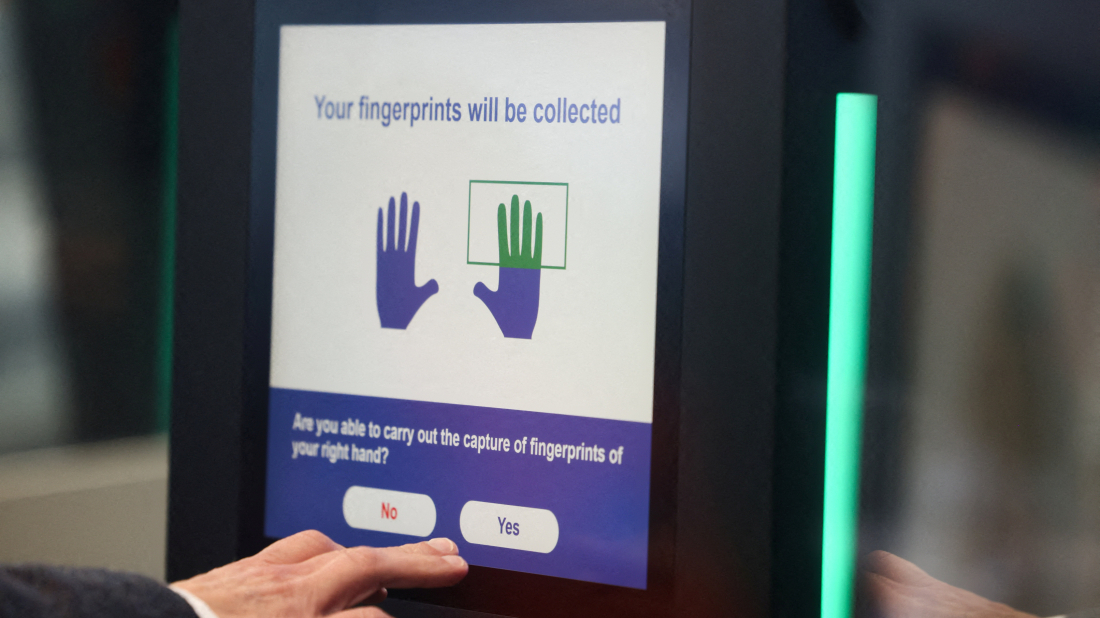Prime Minister Carney announces new Chief Trade Negotiator to the United States
The Prime Minister, Mark Carney, announced on 16 February that the Honourable Janice Charette has been appointed as the next Chief Trade Negotiator to...

From Sunday, all non-EU citizens, including British visitors, will face new biometric checks when entering and exiting the European Union under its long-delayed Entry/Exit System (EES).
The EES will require travellers to register fingerprints, facial images, and personal details when they first enter the Schengen area, which includes all EU countries except Ireland and Cyprus, as well as Iceland, Norway, Switzerland, and Liechtenstein. Full implementation is expected by 10 April, 2026, with a gradual rollout to prevent long queues.
The electronic system replaces manual passport stamping with digital records linking travel documents to individuals using biometrics. It aims to modernise border management, prevent illegal migration, combat identity fraud, and monitor overstayers.
First-time arrivals must scan their passports, provide fingerprints, and undergo a facial scan. Subsequent trips will only require facial verification. Children under 12 will have their photograph taken. There is no cost for EES registration.
Checks will occur at airports, ports, train terminals, and road border crossings within the Schengen area. At the Port of Dover, Eurotunnel in Folkestone, and London St Pancras, EES registration will be conducted on departure from the UK by French border officials. Passengers will not need to register again until leaving their destination.
The EU expects minimal delays as EES is gradually introduced, with officials able to suspend checks temporarily if queues grow. Freight and coach traffic at Dover and Eurotunnel will face checks from 12 October, with passenger vehicles following later. Eurostar will phase in procedures gradually. The British government advises travellers to allow extra time while the system settles.
EES is a precursor to the European Travel Information and Authorisation System (ETIAS), expected to launch in late 2026. Non-Schengen citizens will need to apply online, provide travel details, pay a €20 fee, and the authorisation will be valid for three years or until passport expiry.
Since April, European visitors to Britain have had to obtain electronic permits before travel.
U.S. Ambassador to NATO Matthew Whitaker said China has the power to bring an end to Russia’s war in Ukraine, arguing that Beijing is enabling Moscow’s military campaign.
Austria’s Janine Flock won the gold medal in the women’s skeleton event at the Milano-Cortina 2026 Winter Olympics on Saturday.
Iran’s Supreme National Security Council Secretary Ali Larijani said the United States could evaluate its own interests separately from those of Israel in ongoing negotiations between Tehran and Washington.
U.S. Secretary of State Marco Rubio on Sunday (15 February) called it “troubling” a report by five European allies blaming Russia for killing late Kremlin critic Alexei Navalny using a toxin from poison dart frogs.
Israel’s National Guard is preparing to deploy drones capable of firing tear gas at Palestinians in the occupied West Bank, including East Jerusalem, as part of security preparations ahead of the Muslim holy month of Ramadan, Israeli Channel 12 reported on Saturday.
ByteDance will take steps to prevent the unauthorised use of intellectual property on its artificial intelligence (AI) video generator Seedance 2.0, the Chinese technology firm said on Monday.
The formation of a black hole can be quite a violent event, with a massive dying star blowing up and some of its remnants collapsing to form an exceptionally dense object with gravity so strong not even light can escape.
BMW is recalling a mid six figure number of vehicles worldwide after identifying a potential fire risk linked to the starter motor.
British chipmaker Fractile will invest £100 million over the next three years to expand its artificial intelligence hardware operations in the UK, opening a new engineering facility in Bristol as it ramps up production of next-generation AI systems.
The European Union has launched its largest semiconductor pilot line under the European Chips Act, investing €700 million ($832 million) in the new NanoIC facility at IMEC in Leuven, Belgium, as part of efforts to strengthen Europe’s technological sovereignty.
You can download the AnewZ application from Play Store and the App Store.

What is your opinion on this topic?
Leave the first comment